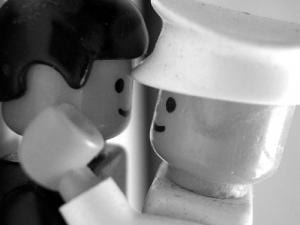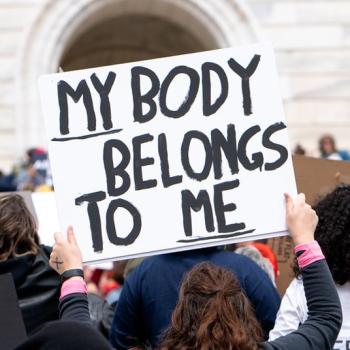We can’t love our LGBT neighbors if we’re too busy judging them. Empathy is a starting place for love and acceptance.
So, if you’re willing to step out of your comfort zone (the “homosexuality is a sin, end of story” zone), let’s do this. Today I’d like to talk about mindset. Next time we’ll start talking Bible.
(My backstory is simple: I was raised as an evangelical, and then I left. I’ve been sorting through the teachings of evangelicalism ever since, and sharing my journey on Patheos. Here is Part One on the LGBT issue, and here is Part Three. My purpose in these posts is not to excuse or rationalize homosexuality – or to condemn it – but to discuss how to be Christlike about it. Also you may want to check out this post on the need to examine our beliefs to see if we really line up with Jesus.)
So, try to imagine for a moment that you are attracted to someone of the same sex. Can you picture it at all? Weird, uncomfortable, isn’t it? It feels unnatural and wrong, doesn’t it?
Now brace yourself. That’s how it feels for a gay person to imagine being attracted to someone of the opposite sex. What you consider “normal” is to them unnatural and wrong. “Normal” to them is the opposite of what it is to you. (This is obvious when you think about it, but we don’t often put ourselves in the shoes of the people we’re passing sentence on.)
So again, really try to visualize being a gay person, and being expected to be attracted to someone of the opposite sex.
This is called empathy. Without it, we may be able to “tolerate” someone we consider different – but can we truly love and accept them if we haven’t made an effort to understand them?
Mind you, I’m not talking about approval here – that’s a whole different subject for another day. I’m talking about love – that thing that Jesus expects of us.
Picture this
So let’s start by trying to envision what a young man or woman might feel when they first begin to realize they are gay.
I imagine that for many, it must be very, very lonely. Unless you’ve been in a very accepting environment all your life, you must feel like there’s something wrong with you. (Don’t jump in and say, “there is something wrong with you” – that’s not what we’re doing right now. We’re doing empathy.)
Just imagine thinking there’s something inherently wrong with you, something you’re ashamed of, maybe something you feel you can’t tell anyone.
Imagine thinking that maybe for the rest of your life, you will be this lonely, this ashamed. Imagine being afraid that your loved ones will reject you, wondering if you will join the statistics of young gay people living on the streets, or being bullied relentlessly, or taking their own lives.
Now please, back up and reread those last few paragraphs. Take the time to actually imagine that is you. Really put yourself in those shoes, feel that pain and fear and isolation. I’ll wait.
Did you do it? If you did, you’ve begun to love.

WWJD?
Next, imagine this: a group of religious men find out that you are gay. They find you, forcibly put you in a car, and start driving. Then they drag you out of the car and throw you on the ground.
They say, “Jesus, this young man/woman is a homosexual! The law says in Leviticus 20:13 that he/she should be put to death. What do you say?”
First of course, Jesus humiliates the religious men and gets them to leave. Now it’s just you and Jesus.
When Jesus spoke to the woman caught in adultery (John 8), he didn’t tell her to stop being a woman, or to never have sex again – he just told her to “sin no more.” (I like to imagine that he then found the man she’d been with and told him the same thing!)
What will Jesus tell you? One thing is sure: he won’t tell you to stop being who you are.
Is homosexuality is a choice?
It’s easy to succumb to confirmation bias – to believe only those experts who support the view we already have (whatever you’re looking for, it’s out there). But we need to acknowledge that more and more good science indicates that homosexuality is something people are born with, to one extent or another (that is, the “nature” is there, but “nurture” is another factor).
The born-that-way vs. chose-that-path debate is, in Christian circles, often dumbed down to an either-or issue, when in fact it is much more complex and nuanced. (This is the case with many other issues in which Christians have a stake – for example, abortion.) Science points toward a genetic predisposition with a complicated environmental component. If our theology can’t hold up under the weight of real science, then our theology might be flawed (and if you think about it, much of our theology was developed hundreds of years ago – all of it by humans – so yeah, it could be flawed).
The born/chose discussion also, often, happens without including actual LGBT people. Really, we should talk to them first, if they want to talk.
Instead of telling them we’ve decided they were born gay or chose to be gay, why aren’t we asking them?
(Now, I know some of you are thinking, “I’m not the one who’s deciding – God is. God wrote the book on it.” Hold that thought. We will address the issue Biblically next time. Subscribe here to follow the conversation.)
We must respect the experience and opinions of those who actually inhabit gay bodies. If a woman believes she was born a lesbian, then for her, that is truth, and we need to proceed accordingly. To simply tell her she is wrong (i.e. her truth is a lie) without some kind of incontrovertible scientific proof is demeaning; to tell her she is wrong because God “would never do that” is scandalous.
Renew your mind
I remember in my evangelical days thinking, “God would never create someone gay. That’s bypassing the whole point of humanity – procreation. Therefore, it has to be a choice.” Some of you are nodding your heads in agreement with that statement, I can sense it. So let’s deconstruct that thinking a moment, shall we?
Of course, every day babies are born with atypical traits – some of which are disabilities that will make their lives very difficult. Some of those traits make it impossible for them to “be fruitful and multiply.”
What do we say in these moments? Certainly not “they can’t procreate, so they’re not fulfilling God’s mandate for their lives.” We usually have a great spiritual answer, like, “God has special plans for him,” or “her courage will be a testimony to the goodness of God.” But when someone identifies as gay, most of us tend not to be so kind.
Why do we single out homosexuality as a trait (or “abomination”) that people must have brought on themselves because God would never permit such a thing to happen? Why aren’t we saying, “God has special plans for him; her courage will be a testimony to the goodness of God”?
Bottom line for today: in order to have any hope of accepting and loving our LGBT neighbors, we must lean in and have empathy, and we must not define their reality for them. We must be teachable and ready to believe differently if we’ve been – for all our good intentions – on the wrong track.
Christianity has perpetrated atrocities (like the Crusades) and perpetuated others (like slavery), so we are fully capable of holding beliefs that are erroneous and destructive. Humility should be our middle name.
And Jesus should be our guide.
FEATURED IMAGE: “Rainbow Flag” by karlsbad is licensed under CC BY-NC-SA 2.0













